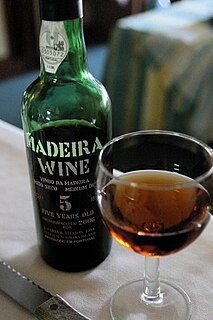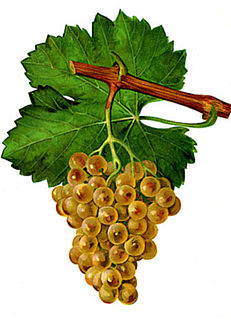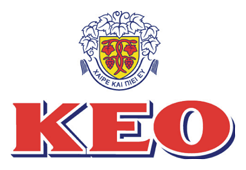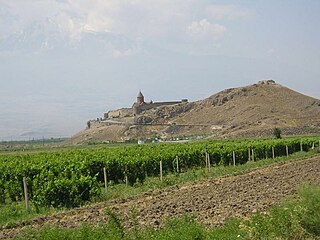
Fortified wine is a wine to which a distilled spirit, usually brandy, has been added. In the course of some centuries, winemakers have developed many different styles of fortified wine, including port, sherry, madeira, Marsala, Commandaria wine, and the aromatised wine vermouth.

Vermouth is an aromatized fortified wine, flavoured with various botanicals and sometimes colored.

Madeira is a fortified wine made on the Portuguese Madeira Islands, off the coast of Africa. Madeira is produced in a variety of styles ranging from dry wines which can be consumed on their own as an aperitif to sweet wines usually consumed with dessert. Cheaper cooking versions are often flavoured with salt and pepper for use in cooking, but these are not fit for consumption as a beverage.

Sparkling wine is a wine with significant levels of carbon dioxide in it, making it fizzy. While the phrase commonly refers to champagne, EU countries legally reserve that term for products exclusively produced in the Champagne region of France. Sparkling wine is usually either white or rosé, but there are examples of red sparkling wines such as the Italian Brachetto, Bonarda and Lambrusco, and the Australian sparkling Shiraz. The sweetness of sparkling wine can range from very dry brut styles to sweeter doux varieties.

Canning is a method of preserving food in which the food contents are processed and sealed in an airtight container. Canning provides a shelf life that typically ranges from one to five years, although under specific circumstances, it can be much longer. A freeze-dried canned product, such as canned dried lentils, could last as long as 30 years in an edible state. In 1974, samples of canned food from the wreck of the Bertrand, a steamboat that sank in the Missouri River in 1865, were tested by the National Food Processors Association. Although appearance, smell, and vitamin content had deteriorated, there was no trace of microbial growth and the 109-year-old food was determined to be still safe to eat.

Chenin blanc is a White wine grape variety from the Loire Valley of France. Its high acidity means it can be used to make everything from sparkling wines to well-balanced dessert wines, although it can produce very bland, neutral wines if the vine's natural vigor is not controlled. Outside the Loire it is found in most of the New World wine regions; it is the most widely planted variety in South Africa, where it was historically also known as Steen. The grape may have been one of the first to be grown in South Africa by Jan van Riebeeck in 1655, or it may have come to that country with Huguenots fleeing France after the revocation of the Edict of Nantes in 1685. Chenin blanc was often misidentified in Australia as well, so tracing its early history in the country is not easy. It may have been introduced in James Busby's collection of 1832, but C. Waterhouse was growing Steen at Highercombe in Houghton, South Australia, by 1862.

Sémillon is a golden-skinned grape used to make dry and sweet white wines, mostly in France and Australia. Its thin skin and susceptibility to botrytis make it dominate the sweet wine region Sauternes AOC and Barsac AOC.

McLaren Vale is a wine region in the Australian state of South Australia located in the Adelaide metropolitan area and centred on the town of McLaren Vale about 38 kilometres (24 mi) south of the Adelaide city centre. It is internationally renowned for the wines it produces and included within the Great Wine Capitals of the World. The region was named after either David McLaren, the Colonial Manager of the South Australia Company or John McLaren (unrelated) who surveyed the area in 1839. Among the first settlers to the region in late 1839, were two English farmers from Devon, William Colton and Charles Thomas Hewett. William Colton established the Daringa Farm and Charles Thomas Hewett established Oxenberry Farm. Both men would be prominent in the early days of McLaren Vale. Although initially the region's main economic activity was the growing of cereal crops, John Reynell and Thomas Hardy planted grape vines in 1838 and the present-day Seaview and Hardy wineries were in operation as early as 1850. Grapes were first planted in the region in 1838 and some vines more than 100 years old are still producing. Today there are more than 88 cellar doors in McLaren Vale. The majority are small family-run operations and boutique wineries.

Pork and beans is a culinary dish that uses pork and beans as its main ingredients. Numerous variations exist, usually with a more specific name, such as Fabada Asturiana, Olla podrida, or American canned pork and beans.

Bodegas Vega Sicilia is a Spanish winery located in the Ribera del Duero Denominación de Origen in the Province of Valladolid, Castile and León. The winery was founded in 1864 by Don Eloy Lecanda y Chaves, who planted various grapes from the Bordeaux wine region of France, including Cabernet Sauvignon and Merlot, which are still being used in the wines today.

KEO plc, the Greek abbreviation for Cyprus Wine Company, is a European beverage company based on the island of Cyprus. It was formed in 1927 and it represents one of the largest industrial employers on the island with more than 90 brands in its portfolio. Its shares are traded on the Cyprus Stock Exchange.

Instant soup is a type of soup designed for fast and simple preparation. Some are homemade, and some are mass-produced on an industrial scale and treated in various ways to preserve them. A wide variety of types, styles and flavors of instant soups exist. Commercial instant soups are usually dried or dehydrated, canned, or treated by freezing.
Dick Van Patten's Natural Balance Pet Foods is an American pet food manufacturer with its headquarters located in Burbank, Los Angeles, California. Established in 1989 by actor Dick Van Patten, the company markets itself as "Food For a Lifetime" and promotes itself as having "the finest food you can buy for your pet." A subsidiary of Big Heart Pet Brands, it is currently owned by the J.M. Smucker Company.

Friskies is a brand of wet and dry cat food and treats. It is owned by Nestlé Purina PetCare Company, a subsidiary of Nestlé global. Friskies was initially introduced by Carnation Company in the 1930s as a dog food brand. When Friskies cat food was introduced in the 1950s, it was the first dry pet food product specifically for cats. The brand was acquired by Nestlé in 1985. From the 1970s to the 2000s, variations in Friskies cat food proliferated as the competition for consumer spending intensified.
Kooksoondang is a Korean brewery, founded in 1952. The name is translated to mean "house of good yeast and good wines."

Cream of mushroom soup is a simple type of soup where a basic roux is thinned with cream or milk and then mushrooms and/or mushroom broth are added. It is well known in North America as a common type of condensed canned soup. Cream of mushroom soup is often used as a base ingredient in casseroles and comfort foods. This use is similar to that of a mushroom-flavored gravy.

Soup is a primarily liquid food, generally served warm or hot, that is made by combining ingredients of meat or vegetables with stock, or water. Hot soups are additionally characterized by boiling solid ingredients in liquids in a pot until the flavors are extracted, forming a broth. Soups are similar to stews, and in some cases there may not be a clear distinction between the two; however, soups generally have more liquid (broth) than stews.

Armenian wine is wine made in Armenia, in the region of South Caucasus. Armenia is one of the oldest wine producing regions of the world. In particular, the oldest known winery was found in Armenia's Areni region, which to this day is still known of its wine production and endemic grapes.

Prince Edward County Wine is produced in Prince Edward County (PEC) located in south eastern part of southern Ontario, the most southerly part of Canada. Prince Edward County was designated as the fourth and newest Designated Viticultural Area (DVA) in Ontario in 2007. A DVA is a wine-producing region for which rules and regulations are set down by the Vintners Quality Alliance (VQA) of Ontario. VQA Ontario is an organization officially delegated by the government of Ontario to administer and enforce the Vintners Quality Alliance Act, 1999 There are currently some 42 commercial wineries and over 50 wine grape growers in Prince Edward County, cultivating more than 700 acres of vineyard, producing 757 tons of grapes and 6130 hectolitres of wine annually.

Sardines ("pilchards") are a nutrient-rich, small, oily fish widely consumed by humans and as forage fish by larger fish species, seabirds and marine mammals. Sardines are a source of omega-3 fatty acids. Sardines are often served in cans, but can also be eaten grilled, pickled, or smoked when fresh.

















